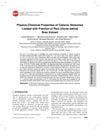 16 citations,
August 2014 in “Archives of Pharmacal Research”
16 citations,
August 2014 in “Archives of Pharmacal Research” Special nanoparticles increased skin absorption of hair loss treatments with fewer side effects.
 14 citations,
September 2012 in “Journal of nanoscience and nanotechnology”
14 citations,
September 2012 in “Journal of nanoscience and nanotechnology” Niosomes with rice bran extract could be useful for anti-hair loss products.
[object Object]  2 citations,
May 2021 in “Research Square (Research Square)”
2 citations,
May 2021 in “Research Square (Research Square)” Ketoconazole loaded solid lipid nanoparticles can penetrate skin better than regular drug suspension and marketed product, providing slow, sustained release and improved stability.
1 citations,
August 2022 in “BioMed Research International” Chitosan-decorated nanoparticles can improve skin delivery and reduce side effects of finasteride.
 December 2024 in “International Journal of Drug Delivery Technology”
December 2024 in “International Journal of Drug Delivery Technology” The new delivery method for dutasteride is more effective and has fewer side effects.
 November 2024 in “Pharmaciana”
November 2024 in “Pharmaciana” The optimized chia seed oil hair serum is stable and meets all physical requirements.
 December 2023 in “International Journal of Pharmaceutics”
December 2023 in “International Journal of Pharmaceutics” New nanoparticles deliver plant extracts to hair follicles to treat conditions like hair loss and acne.
 September 2022 in “KnE medicine”
September 2022 in “KnE medicine” Higher candle nut oil concentration increases droplet size and changes the hair tonic's properties and stability.
 July 2022 in “International Journal of Applied Pharmaceutics”
July 2022 in “International Journal of Applied Pharmaceutics” The optimized caffeine formula improved hair growth and penetrated all skin layers.
 November 2021 in “Research Square (Research Square)”
November 2021 in “Research Square (Research Square)” The new caffeine cream works better for hair growth than existing products.
 January 2021 in “Figshare”
January 2021 in “Figshare” Coenzyme Q10 in nanocarriers improves treatment for hair loss.

A new peptide, murikal/SPR4, was found to significantly increase hair growth in mice, and its liposomal topical formulations enhanced hair growth more than commercial products. However, results on human scalp skin were unclear, needing more tests.
January 2020 in “Brazilian Journal of Health and Pharmacy” Nanostructured lipid carriers can improve finasteride delivery for better hair loss treatment.
 1 citations,
May 2023 in “International Journal of Applied Pharmaceutics”
1 citations,
May 2023 in “International Journal of Applied Pharmaceutics” Placenta extract in novasomes improved rat hair growth better than minoxidil and placenta extract in liposomes.
 March 2024 in “International journal of pharmaceutics. X”
March 2024 in “International journal of pharmaceutics. X” Spanlastic-laden nanogel could be a better way to deliver hair growth medication through the skin for treating hair loss.
January 2021 in “Figshare” Tiny lipid particles carrying 17-α-estradiol gather in hair follicles, which may help target alopecia treatment.
[object Object] January 2020 in “Journal of the Brazilian Chemical Society” Tiny lipid particles loaded with a hormone gather in hair follicles, which may help treat hair loss.
 59 citations,
October 2012 in “Pharmaceutical Research”
59 citations,
October 2012 in “Pharmaceutical Research” Squalene-based carriers improve delivery of a treatment to hair follicles for alopecia areata.
 44 citations,
August 2017 in “Food Bioscience”
44 citations,
August 2017 in “Food Bioscience” Researchers made a special butter with added betasitosterol that could be healthier for the heart and stayed good for three months.
 21 citations,
April 2012 in “European Journal of Pharmaceutics and Biopharmaceutics”
21 citations,
April 2012 in “European Journal of Pharmaceutics and Biopharmaceutics” The gel with special fat-loaded particles from rice bran could be an effective skin treatment for hair loss.
 17 citations,
June 2017 in “Journal of pharmaceutical sciences”
17 citations,
June 2017 in “Journal of pharmaceutical sciences” Researchers developed a nanomedicine for acne treatment that delivers medication with less irritation and is non-irritating for oily skin.
30 citations,
November 2015 in “Advanced Pharmaceutical Bulletin” Nanoethosomes can improve the skin penetration of Lidocaine for topical use.
 18 citations,
August 2019 in “Drug Development and Industrial Pharmacy”
18 citations,
August 2019 in “Drug Development and Industrial Pharmacy” Quercetin-loaded nanoparticles can penetrate skin, minimize hair loss, and promote hair regrowth, showing slightly better results than a marketed product.
 9 citations,
July 2017 in “Journal of Drug Delivery Science and Technology”
9 citations,
July 2017 in “Journal of Drug Delivery Science and Technology” Scientists developed a new method to deliver alopecia treatment directly to hair follicles, which could be a promising treatment for hair loss and other hair diseases.
 December 2024 in “Tropical Journal of Natural Product Research”
December 2024 in “Tropical Journal of Natural Product Research” The developed carrier may improve hair growth treatments using brown algae extract.
 June 2024 in “Pharmacon Jurnal Farmasi Indonesia”
June 2024 in “Pharmacon Jurnal Farmasi Indonesia” A 1:3 ratio of virgin coconut oil to candlenut oil is best for promoting hair growth.
December 2023 in “Pharmaceutics” The new adhesive nanoparticles are effective for delivering Minoxidil to the scalp without skin irritation.
February 2023 in “Journal of Microencapsulation” The finasteride nanosystem with trehalose is stable and effective for topical hair loss treatment.
Optimized carriers effectively deliver Finasteride for hair loss treatment.
10 citations,
July 2013 in “International Journal of Research in Pharmaceutical Sciences” The herbal microemulsion was safe and more effective at controlling hair loss than a standard product.





















